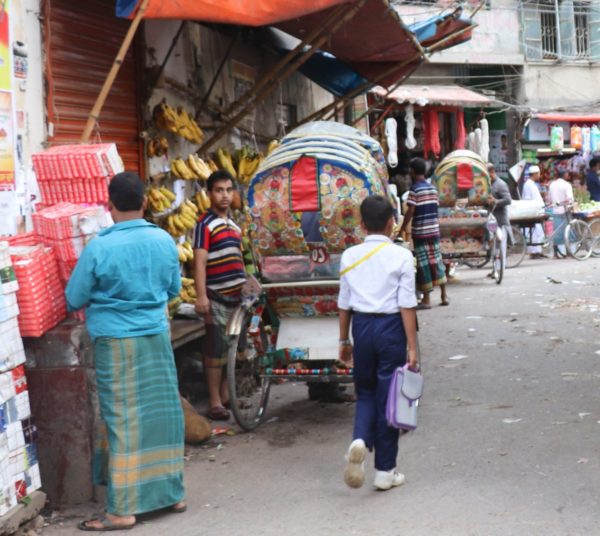Picturing Dhaka: Bustling streets, famous street food and rubbish playgrounds
In this picture blog for the Centre for Sustainable, Healthy, and Learning Cities and Neighbourhoods (SHLC), Irfan Shakil, Tanjil Sowgat and S. M. Tafsirul Islam explore the streets of Dhaka. They come across busy streets, challenging transport and traditional street food. All pictures and captions by the SHLC research team at Khulna University. All views are the author’s own and not attributed to SHLC.
Bustling Dhaka is awake until very late at night. Despite heavy traffic and miserable walking conditions, life goes on. The roads host different modes and uses in Dhaka. Everyone is trying their best to make a claim of their right.

Smaller roads can be equally unsafe. This road without footpaths is an everyday route to school for some pupils. At the same time, inadequate buses force commuters to find alternative public transport options.
In another part of town, women attend a vegetable market to shop for their families. Famously known as ‘ brides market’, this market also has female shop keepers. While men are away for work, women come out and do business in their own neighborhoods. Unlike many other markets, people can buy a single piece of onion or green chilli if they wanted to. Nothing is wasted in these communities and everyone is busy doing something to make lives affordable.
Further South, Riverine Bangladesh has plenty of fish to offer to its citizen. Dinner without fish is almost impossible. However, people who sell these fishes travel a distance to do their business. They find it difficult to stay in the heart of the city and rent a place in poorly serviced slums. Many of these people hardly have fish as their regular diet.
Not too far away, a street food stall sells “Imarti”, a tradition that has lived on for over 400 years of city life in Dhaka. Made from flour and sugar syrup, this unique ‘sweet’ is a part of special occasions in the local culture and people also have them in the evening as snacks. Younger generations often refuse Imarti for its high concentration of sugar and unhygienic cooking process. Yet, elders say that they ran recall their ‘childhood’ memories when they have Imarti and will never stop eating it.
Slums of Dhaka have limited and sometimes polluted open space but that cannot keep children away from their joyful playtime. With rapidly decreasing open spaces, children are forced to play wherever they find and empty space. However, these open sites are dangerous disposal sites of disease spreading wastes including medical wastes.
Tangled electric wires are risky and often end up in serious accidents, but people here learnt to ignore the risk and live with it. Informal arrangements for cable connections and illegal use of government electric poles keep the monthly cable tv costs as low as £2.
This piece has been reposted from the SHLC website. You can see the original post here.





